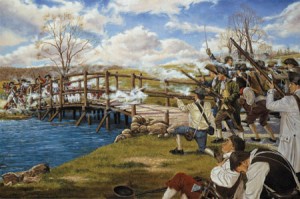Sixty-two years after the start of the American Revolution, on July 4, 1837, at the Independence Day celebration in Concord, Mass., the phrase the “shot heard round the world” was first uttered.
Coined by Ralph Waldo Emerson in his poem “Concord Hymn,” it refers to the first shot fired at the North Bridge in Concord when British soldiers faced off against colonial minutemen. Though this shot was not the very first of the Revolution, it did occur on the same day that the Revolution began, and today it remains a well-known reference to the beginning of America’s fight for independence.
The events of April 19, 1775, began as 700 British troops reached Lexington, Mass., in the early hours of the morning. The troops’ orders were to capture munitions and arrest colonial revolutionaries. Militia units from Massachusetts—the birthplace of the National Guard—amassed in response to the British offensive. A skirmish ensued on Lexington Green, where the very first shot of the Revolution was fired and where eight militiamen were killed.
After the encounter, the British proceeded to Concord and met the militiamen of the 2nd Middlesex County Regiment, today’s 182nd Infantry, at North Bridge. The “shot heard round the world” refers to the first shot fired in Concord—the first shot that militiamen were actually ordered to take. The British troops retreated back into Boston, where colonial forces surrounded them for eleven months until their eventual withdrawal to sea.
With the creation of the Continental Army in June 1775, many militiamen would enlist there as soldiers, while others would remain a part of the state militias that supported the regular army throughout the war. But on the 238th anniversary of the beginning of the American Revolution, we are reminded of the origins of the citizen-soldier tradition. The men who fought at Lexington and Concord were “embattled farmers,” as Emerson wrote in “Concord Hymn,” who abandoned their plows in order to assert their independence.


